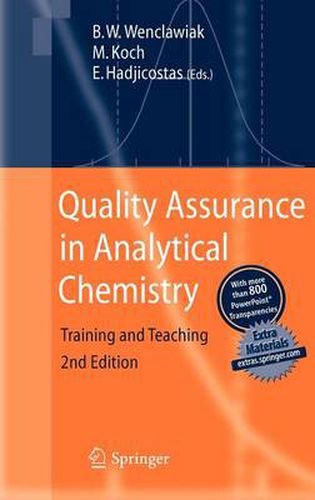Readings Newsletter
Become a Readings Member to make your shopping experience even easier.
Sign in or sign up for free!
You’re not far away from qualifying for FREE standard shipping within Australia
You’ve qualified for FREE standard shipping within Australia
The cart is loading…






This title is printed to order. This book may have been self-published. If so, we cannot guarantee the quality of the content. In the main most books will have gone through the editing process however some may not. We therefore suggest that you be aware of this before ordering this book. If in doubt check either the author or publisher’s details as we are unable to accept any returns unless they are faulty. Please contact us if you have any questions.
knowledge. This material provided has been collected from different sources. One important source is the material available from EURACHEM. Eurachem is a network of organisations in Europe having the objective of establishing a system for the international tra- ability of chemical measurements and the promotion of good quality practices. It provides a forum for the discussion of common problems and for developing an informed and considered approach to both technical and policy issues. It provides a focus for analytical chemistry and quality related issues in Europe. You can find more information about EURACHEM on the internet via Eurachem -A Focus for Analytical Chemistry in Europe (http://www.eurachem.org). In particular the site Guides and Documents contains a number of different guides, which might help you to set up a quality system in your laboratory. The importance of quality assurance in analytical chemistry can best be described by the triangles depicted in Figs. 1 and 2. Quality is checked by testing and testing guaranties good quality. Both contribute to progress in QA (product control and quality) and thus to establishing a market share. Market success depends on quality, price, and flexibility. All three of them are interconnected. Before you can analyse anything the sample must be taken by someone. This must be of major concern to any analytical chemist. There is no accurate analysis wi- out proper sampling. For correct sampling you need a clear problem definition. There is no correct sampling without a clear problem definition
$9.00 standard shipping within Australia
FREE standard shipping within Australia for orders over $100.00
Express & International shipping calculated at checkout
This title is printed to order. This book may have been self-published. If so, we cannot guarantee the quality of the content. In the main most books will have gone through the editing process however some may not. We therefore suggest that you be aware of this before ordering this book. If in doubt check either the author or publisher’s details as we are unable to accept any returns unless they are faulty. Please contact us if you have any questions.
knowledge. This material provided has been collected from different sources. One important source is the material available from EURACHEM. Eurachem is a network of organisations in Europe having the objective of establishing a system for the international tra- ability of chemical measurements and the promotion of good quality practices. It provides a forum for the discussion of common problems and for developing an informed and considered approach to both technical and policy issues. It provides a focus for analytical chemistry and quality related issues in Europe. You can find more information about EURACHEM on the internet via Eurachem -A Focus for Analytical Chemistry in Europe (http://www.eurachem.org). In particular the site Guides and Documents contains a number of different guides, which might help you to set up a quality system in your laboratory. The importance of quality assurance in analytical chemistry can best be described by the triangles depicted in Figs. 1 and 2. Quality is checked by testing and testing guaranties good quality. Both contribute to progress in QA (product control and quality) and thus to establishing a market share. Market success depends on quality, price, and flexibility. All three of them are interconnected. Before you can analyse anything the sample must be taken by someone. This must be of major concern to any analytical chemist. There is no accurate analysis wi- out proper sampling. For correct sampling you need a clear problem definition. There is no correct sampling without a clear problem definition